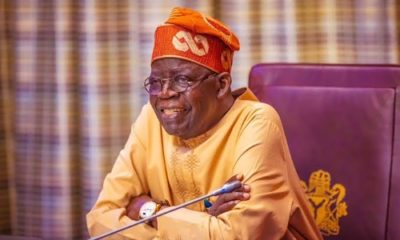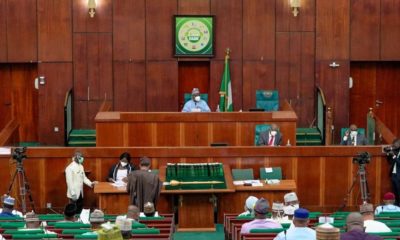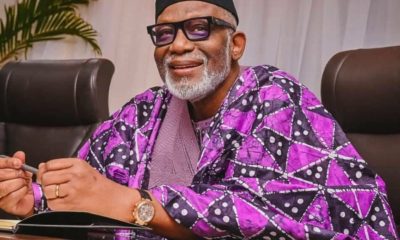NEWS
Audit Query: Reps panel Probes NPA, Terminal Operator over $68.473m debts

…As NPA Boss Gives Details Of Transactions
By John Danjuma
The Public Account Committee, (PAC) of the House of Representatives is investigating the Nigerian Port Authority, NPA and Terminal Operators (Nigeria) Limited over $68,473m debts owed the Federal Government on lease and Throughput fair between 2006 and June 2022.
The Committee being Chaired by Hon Busayo Oluwole Oke (PDP Osun) is also investigating the Terminal Operator for using own exchange rate different from the official one approved by the Central Bank of Nigeria, CBN in calculating revenue accuring to the Federal government
All were contained in the query from the office of the Auditor General of the Federation.
The Managing Director of the Nigeria Port Authority (NPA) Mohammed Bello-Koko had indicated in a submission to the Committee that one of the Port operators in charge of the Rivers Port, and Terminal Operators (Nigeria) Limited used its own exchange rate in calculating revenue accruing to the Nigerian government
The NPA boss stated in the Submission that PTOL used N116 to the dollar at a time when the official exchange rate was fixed at N305 to the dollar by the Central Bank of Nigeria in 2016.
The submission dated 27th July, 2022 which was in response to a letter from the committee also revealed that even while using another exchange rate of N151 agreed to after reconciliation, the terminal operator was still indebted to the government to the tune of $68.473 million as at 13th October, 2021.
The Auditor General of the Federation had indicted the company for not paying its lease fees and throughout fee to the government as at when due.
However, in its submission, the company claimed that contrary to the report of the Auditor General, it had been paying its lease fees and Throughput fee to the Nigeria Port Authority as at when due contrary to the AuGF report.
A supporting document submitted by the NPA to the House committee tabulated the payments made by two concessionaires (BUA and PTOL) on lease and Throughput fees between 2006 and June 2022.
A close study of the document however showed a huge disparity in the figures being owed the government by the company.
For example, while the document suggested that in 2008, PTOL was given a bill of $11,333,333.31 and paid $3,333,333.31, outstanding balance against them was put at $17,194,444.67 instead of $8,000,000.
Similarly, in 2019, the bill given to the company for its operation at the Rivers Port Complex stood at $10,080,000.00.
However, while the document indicated that they paid $3,000,000, outstanding balance against them was put at $102,714,749.66, a figure far above the bill given to it as its lease fee.
However, the NPA letter reads: “Your letter dated 20th, July 2022 to the Authority refers to the historical background of the debt profile of PTOL to NPA dated back to – the inception of the concession, in 2006.
“These issues revolve around the inability of the Operator to make payment on its lease fees as signed with BPE and NPA.
PTOL gave the following reasons among others for its indebtedness to NPA:
“Amortization of berth 1-3. The difference in-amortization carried out by PTOL and what was recognized by NPA was significant when converted from dollar to naira.
“NPA relied on the existing exchange rate given by CBN at 305 as at year 2016, at the time of reconciliation while PTOL used N116 to a dollar, being the -rate of dollar at the time of reconstruction.
“After reconciliation, a N151 to dollar was adopted, as stipulated in the supplemental agreement. The difference in valuation amounted to $11,068,187.16 and a credit note was issued on the 5th June, 2020.
“PTOL claimed no operation happened at the berth during the construction period of 2007 – 2009, hence loss of revenue. PTOL claimed 6 vessels were handled by NPA after the signing of the lease’ agreement. And a refund of 50% stevedoring element was considered.
“Huge disparity in lease fees charged compared to BUA. Disparity in existing draft with the initial advertised draft of 10 meters.
Security concerns at the Eastern Port. Oil and Gas related cargo vessel diversion to Onne Port, which they claimed affected their revenue.”
The letter said further that the outstanding debt profile as at June, 2019 against PTOL in NPA records stood at $100,985,846.82 while PTOL acknowledge only $77 ,976,788.81.
READ ALSO: Reps to Mount Diplomatic Pressure for Ekweremadu
It indicated further that at a joint meeting with BPE, PTOL and NPA on the 14th December 2021 on resolving the outstanding debts of the terminal operator, a further reconciliation was carried out by NPA and PTOL at the Rivers Port.
It said the highlights of the reconciliation showed that “an implementation of a further reduction of 25% lease fee review granted by the Ministry of Transport and BPE in June, 2015.
“This was predicated on the terminal operator paying a Guarantee Minimum Tonnage (GMT) penalty of $2,849,404.41. This review was not Implemented by failure of PTOL to pay the stipulated penalty. A further agreement to issue a credit note of $1,940,821.16 for the
period the detained vessels were at the PTOL berth. These vessels were detained by various government agencies.”
The letter also said that a credit note of $11,821,500.16 was raised for the non-utilization in the berth during the reconstruction of berth 1 – 3 undertaken by PTOL.
It stressed that the second round of reconciliation report is yet to be approved by the Board of the NPA before its dissolution by the Honorable Minister of Transport, while the
report has been forwarded to the reconstituted board and is currently being considered.
It said that after these reconciliations, PTOL debt profile to NPA stood at $68,473,637.72 as at 13th October,2021.
Determined to get to the root of the matter, Committee has directed both the NPA boss and the terminal Operator to appear before it on Tuesday for further investigation.
NEWS
Moghalu Prescribes Good Governance As Panacea To Ethnic Agitation

The President of the African School of Governance, Kingsley Chiedu Moghalu has admonished state actors against resorting to brutal force in the bid to muscle out separatist agitators.
In the aftermath of Mazi Simon Ekpa, the Finland based Biafran nationalist agitator being caught in legal web and the Nigerian government moving swiftly to seek his repatriation, the former deputy governor of the Central Bank of Nigeria (CBN) has cautioned that ‘We either fix our problems, or our problems will eventually “fix” us. No alternative to a renegotiated union.’
ALSO READ: Finnish Police Arrest Simon Ekpa Over Terror-Related Allegations
The political economist, while expressing his hope in Nigeria, made it clear that “hope is not a strategy”.
He bared his mind in a series of posts on his verified handle on micro-blogging site, X on Friday.
Moghalu wrote, “Despite sustained contemporary difficulties, I am hopeful about Nigeria. But hope is not a strategy. We need to improve state capacity for effective governance.
“We either fix our problems, or our problems will eventually “fix” us. No alternative to a renegotiated union.
“We must learn to be honest with ourselves and address the root causes of our problems. Why ignore them, when the problem is actually quite solvable? The problem with continuing with this approach is that when the danger crystallizes, those who thought they were benefiting from
NEWS
N1.7trn Loan: Atiku Blames NASS For Worsening Nigeria’s Debt Burden
Former Vice President, Atiku Abubakar has criticized the federal government’s plan to secure an additional N1.7 trillion loan through Eurobonds to cover a shortfall in the 2024 budget, describing the borrowing as unsustainable and harmful to Nigeria’s economy.
In a statement shared on Thursday via his X (formerly Twitter) handle, Atiku accused the Bola Tinubu-led administration of burdening Nigerians with debt while failing to provide clear answers about the country’s fiscal challenges.
READ ALSO: CSR: Dangote Cement Fuels Education With Support Projects At Lagos Schools
He also faulted the National Assembly for enabling what he called a “voracious appetite” for loans.
The former Peoples Democratic Party (PDP) presidential candidate expressed alarm over a recent World Bank report ranking Nigeria as the third most indebted country to the International Development Association (IDA), calling the development troubling.
“The recent report released by the World Bank, showing Nigeria as the third most indebted country to the International Development Association (IDA), is very concerning,” Atiku stated.
He raised further concerns about the government’s decision to benchmark the proposed loan at an exchange rate of 1 USD to N800, despite the Central Bank of Nigeria’s official rate being over N1,600.
“What makes this particular loan proposal even more concerning is that it is benchmarked at the exchange rate of 1 USD to N800, whereas the current exchange rate from the Central Bank of Nigeria stands at over N1,600 to 1 USD,” he said.
Atiku questioned the need for additional borrowing, given the government’s earlier claims of record-high revenue collection.
“In July this year, Tinubu boasted that the FIRS and Customs under his watch had collected all-time high revenues to finance the budget. Why are they still borrowing?” he said
He accused the government of a lack of transparency, describing the borrowing spree as detrimental to Nigerians already struggling under economic hardship.
“There is something that they are not telling Nigerians, even as they are being crushed by a combination of their failed trial-and-error policies and loan rackets.”
Atiku also referenced a report by BudgIT, a budget monitoring group, which criticized the 2024 budget for its inefficiencies.
He alleged that corruption, rather than infrastructure or development needs, was driving the government’s borrowing decisions.
“These loans are powered by corruption and not for infrastructure and development needs. This voracious appetite for humongous loans is deeply concerning,” he said.
Reflecting on Nigeria’s financial history, Atiku lamented the return to significant foreign indebtedness just years after former President Olusegun Obasanjo’s administration cleared the country’s debt.
“It is agonizing to see that just a few years after the Obasanjo administration took us out of foreign indebtedness, we are today back at the top spot in the same conundrum,” he stated.
He called for a more cautious approach to borrowing, urging the government to prioritize fiscal responsibility and transparency to avoid worsening Nigeria’s economic challenges.
International News
ICC Issues Arrest Warrants For Israeli Prime Minister Netanyahu, Others
The International Criminal Court (ICC) has taken a historic step, issuing arrest warrants for Israeli Prime Minister Benjamin Netanyahu and former Defense Minister Yoav Gallant.
The charges include crimes against humanity and war crimes allegedly committed during Israel’s recent assault on Gaza.
In a detailed statement, the ICC accused the Israeli leaders of “intentionally and knowingly depriving the civilian population in Gaza of objects indispensable to their survival, including food, water, and medicine and medical supplies, as well as fuel and electricity.”
READ MORE: Osun Govt Decries Attempted Murder Of Park Mgt Chairman By Police
The ICC’s move marks a significant escalation in international scrutiny of the Israeli-Palestinian conflict. Netanyahu and Gallant are alleged to have orchestrated policies that caused severe harm to the civilian population in Gaza, leading to widespread condemnation from human rights organizations.
Alongside the charges against Israeli officials, the ICC also issued an arrest warrant for Hamas military commander Mohammed Deif. Deif has long been a central figure in Hamas’s military operations. Israel’s military claims to have killed him in a July airstrike, although this has not been independently verified.
The warrants highlight growing calls for accountability amid the ongoing conflict in the region. The ICC’s actions are likely to provoke heated debate and may complicate diplomatic efforts aimed at resolving the crisis.
With the warrants issued, global attention now turns to how the international community will respond and whether any practical steps will be taken to enforce them.




















